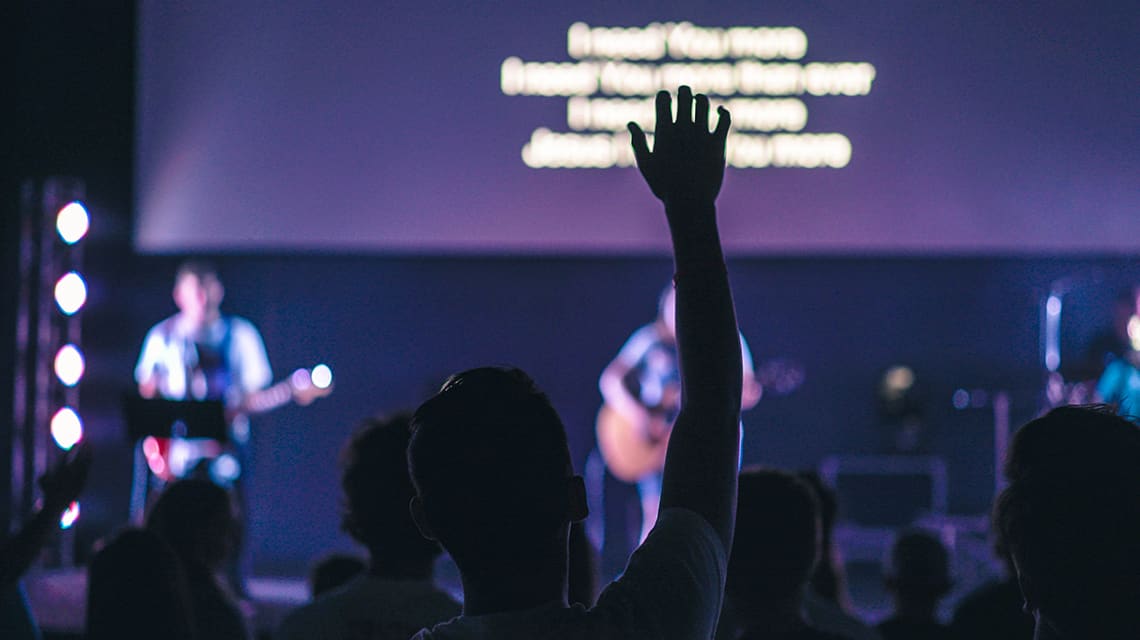How to Write Congregational Worship Music With Meredith Andrews

If you attend church regularly, you’re probably very familiar with worship music, as it’s a regular part of most church services. But, if you listen to worship music outside of church, you’ve probably gathered that not all worship music is the same. The songs you sing in church probably sound a little different from the songs in your Spotify playlist or on your favorite radio station. That’s because worship songs sung at church are written to be congregational.
Congregational worship music is different than singer-songwriter worship music in that is intended to be sung by many people at the same time. Now, we all know that writing a song is no easy task. But, if you’ve ever tried to write your own worship music, you’ve probably realized how difficult it can be to write something congregational. We’re going to give you some of our favorite tips for writing worship music, but first, we decided to consult an expert to give us some important insight.
Meredith Andrews is not only a phenomenal worship leader, but she’s an incredibly gifted songwriter, authoring many of our favorite worship songs, like “Open Up the Heavens,” “Spirit of the Living God,” “Draw Me Nearer,” and “I Look to the King.” But even Meredith struggled at first with writing congregational worship music. Check out the video below to see why she wanted to move past her singer-songwriter style to write songs for the church.
To sum it up, having your heart in the right place is the first step to writing worship music. Just like the process for writing any other type of song, the why is essential. Meredith goes on by stressing the importance and responsibility that comes along with that idea.
As Meredith mentioned, it’s a great idea to surround yourself with people who are already writing worship music. Of course, we’re not telling you to seek out Phil Wickham or Hillsong United, because that might be a little difficult.
An excellent place to start would be asking around your church or community. Try talking to your worship pastor or other members on the worship team. At the very least, you’ll likely run into someone who can point you in the right direction. Not only can you pick up valuable tips and learn about the worship writing process, but you may be able to make some great cowriting connections. Listen to Meredith as she talks about the value of cowriting when it comes to worship music.
You may have noticed that everything we’ve talked about so far has been pretty big-picture. Well, there’s a reason! Having your motivation in the right place, surrounding yourself with positive influences, and being in tune with God has to come before anything else. It’s only natural, as writing congregational worship music is very different from a song you’d write for yourself. Even though many congregational songs come from personal experiences, those messages have to translate in a way that makes sense for a large group of people. Furthermore, the purpose of a worship song isn’t just to influence people, but it’s to point them back to God. So the spiritual side of writing worship music is just as important, if not more important than the technical side.
Still, we want to give you some of those technical points, because we know you’re dying to start writing! But before we do, Meredith has a final word she wants to give to worship leaders, and if you’re aiming to write worship music, that’s you!
Don’t forget to get the latest Meredith Andrews sheet music at Musicnotes.com! Now, onto our final tips.
Tips for Writing Worship Songs
- Keep the “average voice” in mind.
You may be the greatest singer known to man, but if you’re writing congregational worship music, remember that most people sing within a one-octave voice range. If you want everyone to be able to sing along with your songs, you need to keep this mind. A couple of go-to keys for worship leaders are G, D, C, A, and E Major.
On another note, make sure that your melody is singable. Adding too many vocal embellishments or tricky jumps in the melody will make it hard for a congregation to follow.
- Less is more when it comes to lyrics.
Similar to the point about embellishments, try to avoid getting too wordy with your lyrics. A good congregational song has a melody and lyrics that people can catch on to quickly, without overthinking. You don’t want your congregation spending the whole song trying to figure out how to sing that weird three-syllable word into two notes.
- Repetition is good!
A lot of worship music is repetitive. “Who You Say I Am” by Hillsong Worship, “Good Good Father” Chris Tomlin, and “No Longer Slaves” by Bethel Music all use a lot of repetition. Even classic hymns like “Amazing Grace” or “It Is Well with My Soul” use different lyrics over the same melody over and over again. Repetition is great for congregational worship because people can catch on quickly. It can also be quite powerful if you have a really strong lyric to have the congregation sing it a few times.
- Don’t forget the Bible!
Christian songwriters are always thinking of new and creative ways to say things that have already been said. But don’t forget to use your Bible! After all, most worship music pulls a verse, concept, or adjective or two from Scripture. Think of the Bible as your Thesaurus and guide when you’re stumped on a lyric.
We hope you’re feeling inspired to start writing congregational worship music! If you’re needing a little more help when it comes to the songwriting process, make sure to check out our article, “How to Write a Complete Song: An Introduction to Songwriting.” And don’t forget to check out all of the incredible worship music from our friend, Meredith Andrews!

